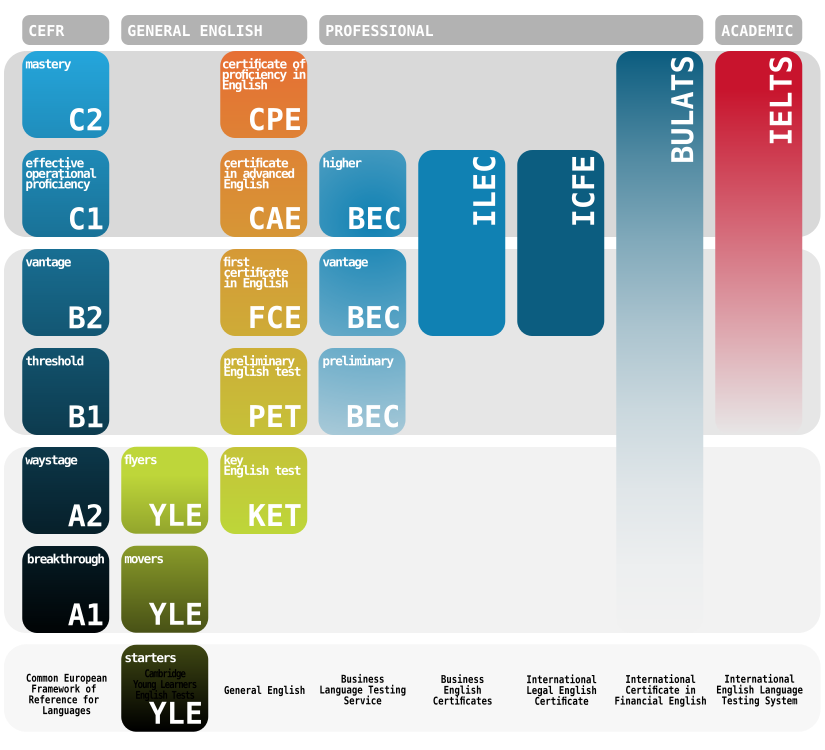C1 Advanced, IELTS or B2 First - Which English exam should you take?
There are so many English language exams that it can be hard to know which English exam to take, C1 Advanced or IELTS or B2 First or another. On this page I will tell you:
- How these exams are measured on the CEFR (A1-C2) scale. (IELTS spans the whole scale, so your grade can be anywhere from A1 (beginner) - C2 (proficient), it depends how many questions you get correct).
- Which exams universities accept.
- IELTS - positives and negatives.
- C1 Advanced (CAE) - positives and negatives.
- B2 First (FCE) - positives and negatives.
I go into a lot more detail about all these topics in my FREE E-book as well!
What Is CEFR?
Most English exams are based around the ‘Common European Framework of Reference (CEFR)’. This is a scale from A1 (beginner) to C2 (proficient). You can see this scale with some different exams in the picture below from https://commons.wikimedia.org/wiki/File:CEFR_and_ESOL_examinations_diagram.svg.
Here is a general guide to what these mean:
A1 - beginner level.
A2 - lower intermediate (understands basic English).
B1 - intermediate (can express what they want most of the time, but it may not be expressed clearly).
B2 - upper intermediate (can communicate fairly well, but often makes grammatical mistakes and has some confusion surrounding technical language).
C1 - advanced learner. Has a very good working knowledge of the language, but still makes some mistakes.
C2 - proficient. Almost native speaker.
Accessing English Universities
You can access a lot of English universities by having passed the CAE exam or having achieved an IELTS score of 6 … but it DOES depend on the university and sometimes the degree.
In this video, I show you how to select a country and a university/workplace and see which English exams they accept:
IELTS - A1-C2
Positives?
IELTS is probably the most well known English language exam in the world.
You cannot pass or fail the IELTS. It simply shows your level of English as a score which can be measured on the CEFR scale (A1-C2).
The test is offered in over 1100 locations in more than 140 countries.
Over 10,000 organisations accept IELTS as proof of language ability.
If you would like to attend a specific university you should check that they accept IELTS as proof of language ability here.
Negatives?
This exam validation expires 2 years after the test date.
The exam format is not very simple. There are many different tasks which you have to complete. You cannot be sure which types of task will be asked in the exam. In my opinion it is more difficult to prepare for than the Cambridge exams.
C1 Advanced (CAE) - C1
Positives?
This exam is well known around the world.
The exam format is fairly straightforward.
You know what types of exam tasks you need to complete.
There is no expiration date for this exam.
It has the word 'Cambridge' in the title.
If you would like to attend a specific university you should check that they accept CAE as proof of language ability here.
Negatives?
This is a difficult exam (C1 – Advanced level).
You can fail this exam (but your score is still shown on your certificate: B2 etc.)
Here is a video I made recently about this exam, there's some really useful information here, so it's worth watching:
First Certificate (FCE) - B2
Positives?
The exam format is fairly straightforward.
You know what types of exam tasks you need to complete.
There is no expiration date for this exam.
It has the word 'Cambridge' in the title.
If you would like to attend a specific university you should check that they accept FCE as proof of language ability here.
Negatives?
You can fail this exam (but your score is still shown on your certificate: B1 etc.)
